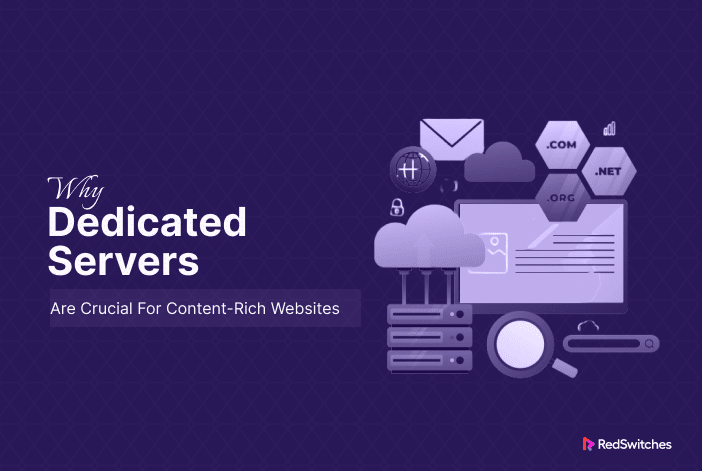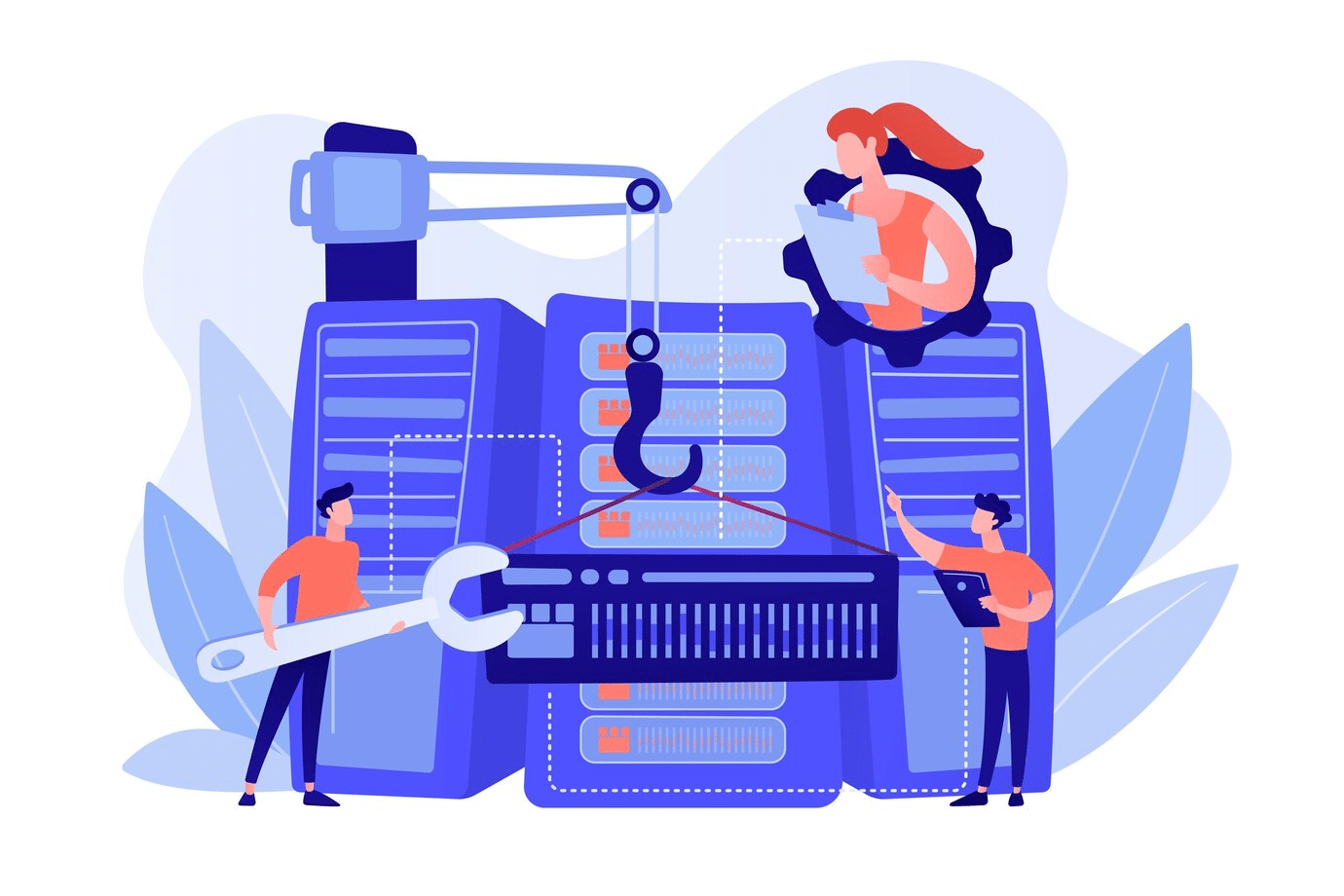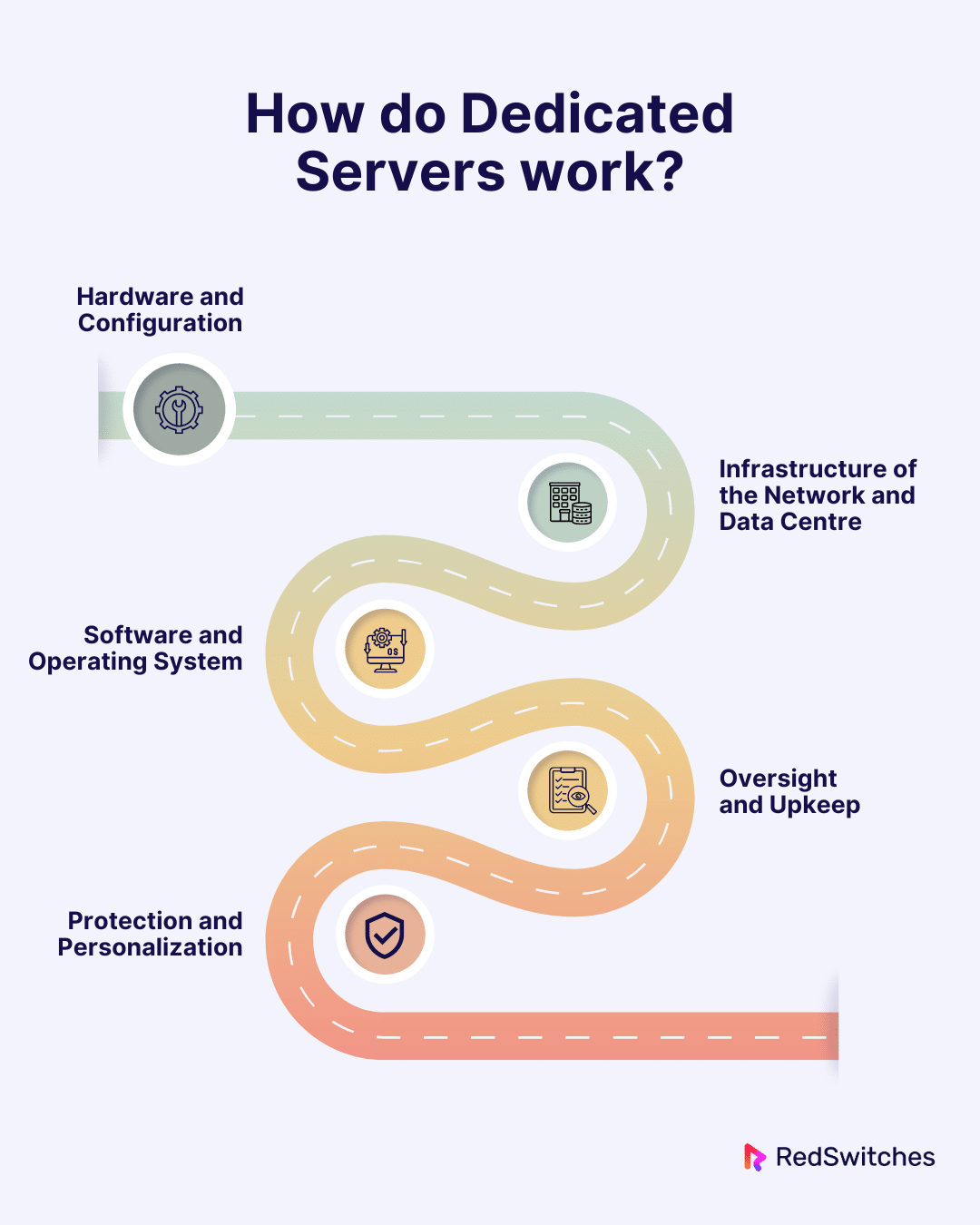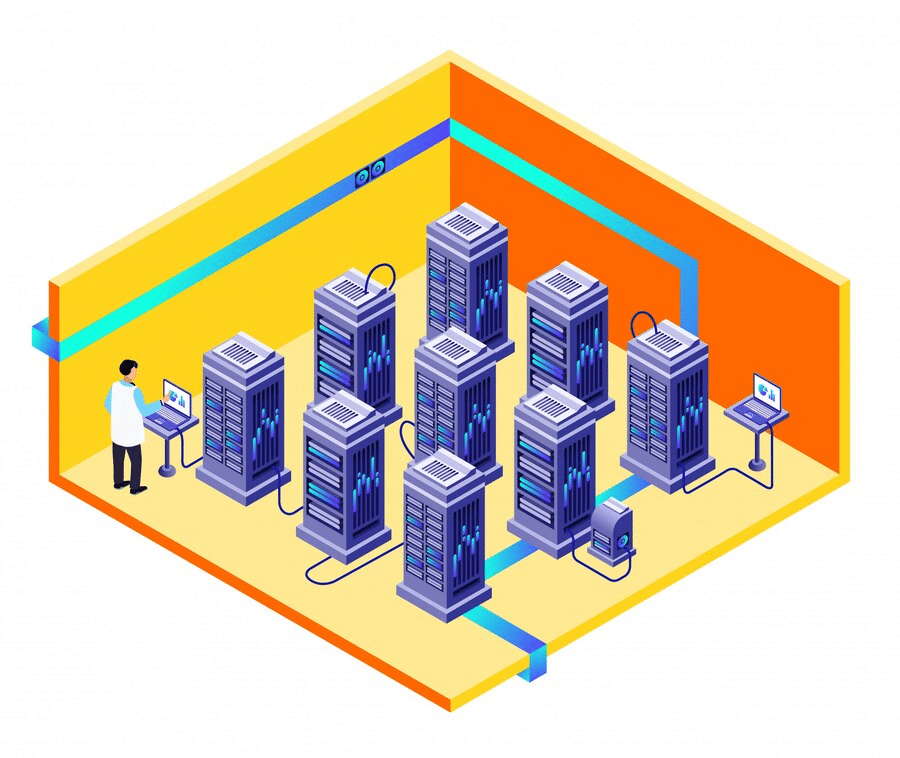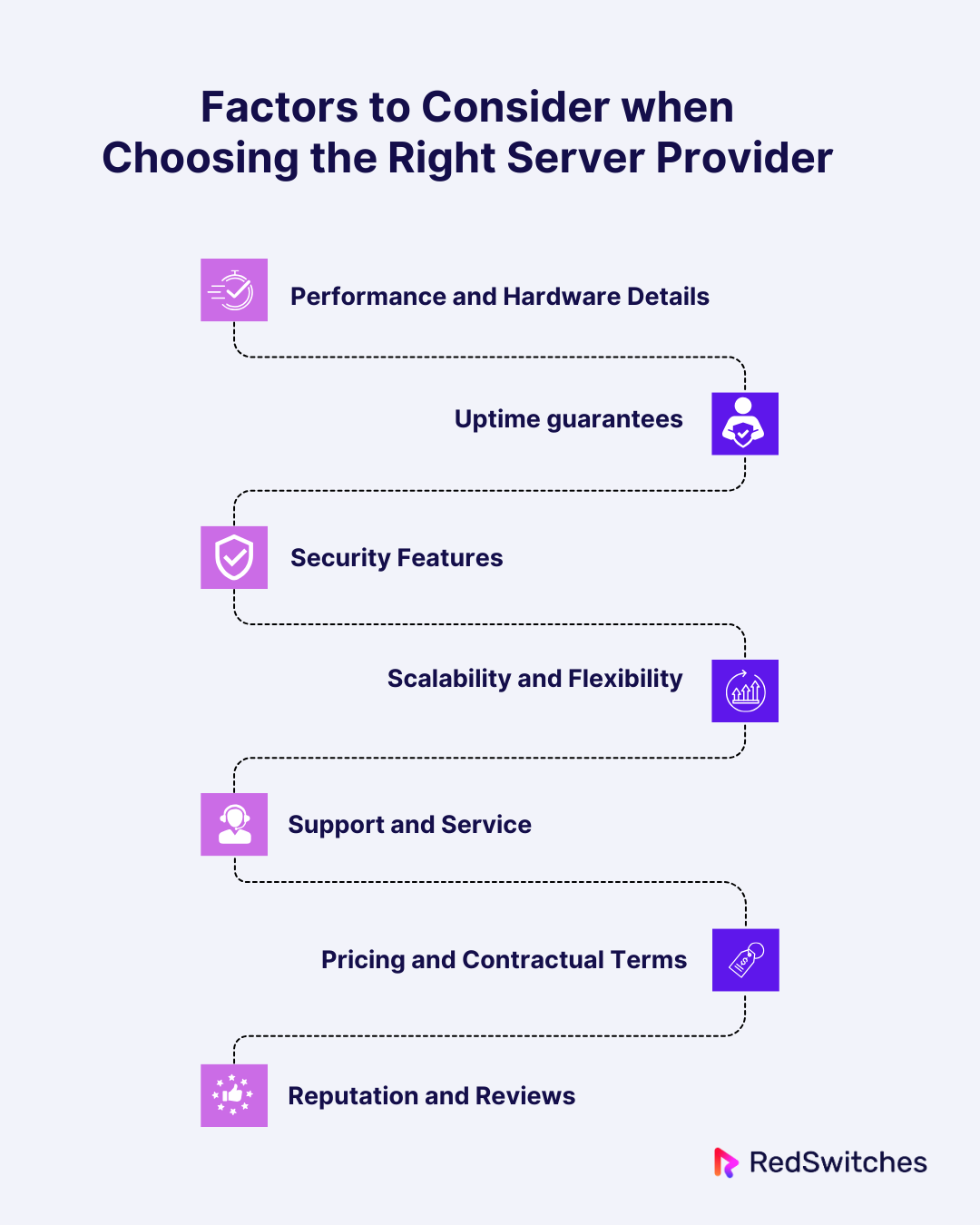Key Takeaways
- Dedicated servers provide an entire server’s resources exclusively to one client, allowing for greater security, reliability, and performance.
- With the ability to implement custom security protocols, dedicated servers offer a secure environment.
- Servers ensure high uptime rates and consistent performance, which is crucial for content-rich websites.
- Servers keep websites accessible and maintain a positive user experience.
- This reliability supports SEO efforts by ensuring websites are always available for crawling and indexing.
- The scalability of dedicated servers allows for easy upgrades to accommodate growth in traffic and data.
- Techniques like load balancing and advanced traffic management solutions, including CDN integration, ensure websites can handle high traffic volumes.
- With full root access, clients can install any software and configure the server to meet their website’s unique requirements.
- Dedicated hosting provides SEO benefits through faster loading times.
Operating a content-rich website digitally has its own set of expectations and obstacles. Finding unmatched management, security, and performance is critical when your website becomes busy. Let me introduce you to private servers, the backbone of popular, high-traffic websites.
In this blog post, we’ll solve the puzzles around dedicated servers and discuss why they are the unsung heroes of content websites. We’ll walk you through how dedicated servers can maximize your website’s potential. They have great security features and strong performance. Come along as we explore dedicated hosting. It’s a necessary step for anyone looking to improve their content website’s performance.
Table of Contents
- Key Takeaways
- What are Dedicated Servers?
- How do Dedicated Servers work?
- Why Dedicated Servers Matter For Content Websites?
- SEO Advantages of Dedicated Hosting
- Factors to Consider when Choosing the Right Server Provider
- Conclusion
- FAQs
What are Dedicated Servers?
Credits: Freepik
Dedicated servers are strong, premium hosting services. Data centers or hosting companies offer them. A customer rents a whole server that isn’t used by anybody else. With this setup, the client controls the server. They can pick the hardware, operating system, and other options from those the provider offers. A dedicated server is exclusive. The client’s websites, apps, or databases only use all its resources, like CPU, RAM, and bandwidth. This ensures better security, dependability, and performance than shared hosting settings.
Another important advantage of dedicated servers is security. Clients can install unique security measures suited to their needs since they control the server environment. This can greatly lower the danger of cyberattacks and data breaches. It includes dedicated IP addresses, security protocols, and sophisticated firewall configurations. Also, dedicated servers for content websites often include more support from the hosting company. This includes 24/7 monitoring, technical help, and backup services. They ensure that any problems are quickly fixed.
How do Dedicated Servers work?
Let’s understand the working procedure of dedicated servers.
Hardware and Configuration
A physical server has hardware elements like a CPU (or several CPUs), RAM, solid-state drives (SSDs), hard disc drives (HDDs), and a network connection. It is called a dedicated server. A dedicated server’s resources go to one client. In shared hosting, resources are split among several users. They use virtual private servers (VPS) that mimic a dedicated environment on shared hardware.
Clients can usually pick the hardware configuration that best meets their needs. They do this when leasing a server. This entails deciding on the CPU type and speed, RAM capacity, size and kind of storage, and even the bandwidth capacity of the server. After that, the hosting company configures the server per these guidelines in their data center.
Infrastructure of the Network and Data Centre
An essential component of the server’s functionality is the data center where it is housed. Data centers have tight security. They also have climate control, backup power, and fast internet. These features protect computers and keep them running. The data center’s network connects the server to the internet. This lets it interact with the client’s user base or audience.
Software and Operating System
After the hardware is set up, the client’s preferred operating system (OS), like Windows or Linux, is installed on the server. The client’s preferences and the particular needs of the apps they intend to run on the server will determine the operating system they use. More software and programs are needed for the website or online service to run. You can install them after the OS. This can include databases like MySQL and PostgreSQL, web servers (like Apache and Nginx), and programming languages (like PHP and Python).
Oversight and Upkeep
There are several ways to administer a server: the hosting provider may offer completely managed services, or the client may choose to maintain the server themselves. OS upgrades, security patches, monitoring, and technical help are common managed services components. On the other hand, a self-managed server places these duties on the client, necessitating a higher degree of technical proficiency.
Protection and Personalization
One of the main benefits of servers is the ability to install specialized security measures. To secure their data and apps, clients can install security software, establish firewalls, and set up other safeguards. Furthermore, there is a far lower chance of cross-site contamination and security breaches because the server is not shared with other users.
Why Dedicated Servers Matter For Content Websites?
Credits: Freepik
In the current digital era, where information can be accessed instantly, a website’s speed and dependability are crucial. A server is even more essential for content-rich websites, which frequently contain many multimedia components, essays, and interactive features.
Content websites, from bustling blogs to expansive online publications, face unique challenges regarding performance and security. Shared hosting, while cost-effective, can struggle to provide the resources and control needed for optimal content delivery. This is where dedicated servers step in, offering a reliable foundation for content websites to thrive.
The Need for Speed and Reliability
This section explores the critical role that dependability and uptime assurances play and the substantial effects that load times have on user experience.
Effect of User Experience on Load Times
Initial Impression Counts: A user’s experience on a website might be positively or negatively impacted by the initial few seconds of their engagement. Websites that load quickly make a good first impression by projecting an air of reliability and efficiency. Conversely, people impatient with slow-loading websites are likely to give up on them before they even load completely. Research has indicated that even a one-second lag can cause notable declines in page visits, consumer satisfaction, and conversion rates.
Search Engine Rankings: Speed is important for users, and search engines value it highly. Website speed is a ranking factor used by Google and other search engines therefore, slower websites may show up lower in search results. A website’s potential income and growth can be directly impacted by this decreased visibility, which can majorly affect the traffic it receives.
Satisfaction and Availability Promises
Uptime Promises: The duration of a website’s availability and functionality is referred to as its uptime. For content-rich websites, high uptime percentages are essential because downtime can result in lost traffic, eroded user trust, and sometimes even income loss. Servers are renowned for their dependability and can ensure uptime of at least 99.9%. This degree of dependability guarantees that users may access websites whenever they choose, keeping them accessible to people worldwide.
Reliability: servers offer a steady performance without the ups and downs frequently observed in shared hosting settings when resources are distributed among several websites. Users want the same caliber of service on each visit; thus, keeping consistency is essential to retaining their interest and happiness.
Customization for Reliability: Thanks to the great customization offered by dedicated hosting, website owners can customize server configurations to meet their unique requirements. This customization can include complex backup methods, hardware selection based on performance needs, and the installation of redundant power sources. These choices improve the website’s dependability by ensuring it can withstand technical problems or heavy traffic.
Handling High Traffic
Credits: Freepik
Managing large amounts of traffic well is critical for content-rich websites. It keeps a good user experience and guarantees stability. To handle these needs, you need servers. They provide scalability and can handle unexpected web traffic increases. They also make load balancing and traffic management easier. Let’s see how servers deal with these issues.
The Capacity to Scale Servers
Flexible Resources: The scalability of servers is one of its main benefits. You can update servers with faster CPUs, more RAM, and more storage. You need to do this as a website grows and gets more traffic. Because of their versatility, websites may accommodate increasing volumes of data and visitors without experiencing performance deterioration.
Custom Configurations: servers provide the freedom to set up hardware and software per particular requirements, unlike shared hosting, which has constrained resources and is not customizable. This means that resources can be tailored to meet the needs of a website with a lot of content. This includes processing big databases, streaming video, and handling high-res photos.
Future-proofing: Planning for expansion is critical, and servers make proactive scaling possible. Website owners should avoid the problems of reactive scaling. It often causes downtime and performance issues. They should plan for future traffic increases and set up the server.
Handling Unexpected Increases in Web Traffic
Quick Access to Resources: All resources are instantly accessible on servers, negating the need to share them with other websites. This is essential. It helps handle unexpected traffic spikes. These spikes come from marketing efforts, viral content, or seasonal peaks. One website has access to all of the server’s resources, guaranteeing it can manage unforeseen visitor spikes.
Overprovisioning Strategy: Some website owners choose to keep more capacity on their servers than what is required for typical traffic. This tactic will help the website handle surges. It won’t need fast server changes or upgrades.
Traffic Management and Load Balancing
User Request Distribution: Load balancing prevents servers from overloading. It divides incoming web traffic among several servers. A server can serve as the main server in a bigger cluster for websites with a lot of traffic, and load balancers can effectively distribute requests to avoid bottlenecks.
Improved Performance and Redundancy: By splitting the load over several servers, we add redundancy to the system and optimize the website’s performance. This implies that the website’s availability and functionality can be maintained if a server experiences problems; other servers can take over.
Advanced Traffic Management: CDNs cache content at edge locations worldwide. They are examples of advanced traffic management solutions. They can be installed on servers. Shortening the distance data travels helps manage traffic loads. It also speeds up sites and helps users from various places.
Enhanced Security
Credits: Freepik
Websites with a lot of content, which frequently store important data and resources, are the targets of cyberattacks. Strong security protocols must be in place to protect users’ information. They also protect this data and the website’s integrity. Servers provide secure hosting. They have dedicated security measures, scalable firewalls, and protocols. They also have efficient strategies to stop DDoS attacks. Servers are designed to meet the security requirements of websites of this kind.
Specific Security Measures
Isolated Environment: servers offer an isolated environment. This is different from shared hosting, where flaws in another website on the same server may harm the security of your website. This isolation provides a safe base for your website. It lowers the risk of cross-site contaminations and attacks.
Improved Performance and Security Monitoring: You can install advanced security software and monitoring tools on servers. They are customized to meet a content-rich website’s unique needs. You can monitor servers in real time with this tech. They can warn and sometimes even reduce security issues before they get worse.
Frequent Security Updates and Patches: Webmasters control the server environment. They can ensure that all software is up-to-date with the latest security patches. By taking a proactive approach to security maintenance, vulnerabilities and exploits can be prevented.
Personalized Firewalls and Security Procedures
Customized Firewall Configurations: Firewalls are your server’s first defense against illegal access. Firewalls on servers can be entirely customized to meet the unique security needs of your website, effortlessly permitting valid traffic to flow through while limiting unauthorized access and blocking suspicious activity.
Advanced Security Protocols: Servers make secure file transfers via secure FTP, encrypted data transmission via SSL/TLS, and secure remote access via SSH possible. These protocols guarantee that information traveling to and from the server is shielded from manipulation and eavesdropping.
VPN and Private Networking: Servers can be set up inside private networks or configured to only permit access through virtual private networks (VPNs) for increased security. This greatly lowers the possibility of outside breaches by limiting server access to authorized workers.
Also Read Firewall Configuration for Enhanced Security – How to Configure a Firewall
Reducing DDoS Incidences
DDoS Protection: Systems for detecting and thwarting extensive attacks are frequently installed on servers. To keep the website accessible to authorized users, these technologies detect unusual traffic patterns and reroute hostile traffic away from the server.
Capacity to Absorb Traffic Spikes: servers’ higher bandwidth and resources act as a buffer against DDoS attack-induced traffic spikes. Although it isn’t a direct countermeasure, this ability can assist in absorbing and lessening the effects of an attack, giving you vital time to put additional defenses in place.
Working Together with Hosting Companies: Many server hosting companies provide specialist DDoS mitigation services. Using their infrastructure and experience can provide another degree of security and hasten the detection and elimination of threats.
Also read How To Prevent DDoS Attacks [8 Proven Tactics You Can Try Right Now!]
Customization and Control
Credits: Freepik
The hosting environment’s ability to be customized and controlled directly impacts the functionality. It also affects the performance and security of content-rich websites. Webmasters and developers should choose servers as the best option for this kind of control. They provide the freedom to install and update software as needed. You get complete root access. You can also customize hosting to meet your needs. Let’s take a closer look at these characteristics.
Complete Root Access and Personalized Setups
Unrestricted Access: Full root access gives the website owner total authority over the server setup. You can use this access to install custom software, change server settings, and make deep system-level updates. Shared hosting platforms can’t support these kinds of changes. This control is vital for managing users. It is for modifying network settings and tweaking file permissions. You need to match them to the needs of a content-rich website.
Custom Hardware Configurations
Servers have the option to alter hardware parameters in addition to software. This can involve choosing specific CPUs and RAM sizes, SSD or HDD storage types, and RAID setups. These choices aim to maximize performance and redundancy. Tailored hardware setups ensure the server can quickly process a lot of data. They also let it manage website loads well and store lots of content safely.
How to Install and Update Software
- Ability to Install Any Software:
Website owners can install any necessary software without limitations with complete root access. This category includes specialized content management systems (CMS). It also includes unique analytics tools, security software, and other items. More efficient and streamlined operations are possible. This comes from having the freedom to pick the best software for the website’s needs. This is better than being stuck with pre-installed packages.
- Patches and Updates on Time:
Maintaining software updates is essential for security and functionality. Servers reduce security risks. They also ensure the website uses the newest enhancements and functionality. They offer the freedom to install updates, fixes, and new features as soon as they are available.
Customized Hosting Conditions
- Improved Performance:
Servers allow us to set up a hosting environment that is perfect for the website’s particular needs. This can involve improving database systems for fast retrieval, creating unique caching methods, and tuning web and app servers for heavy traffic. These changes are vital for content-heavy websites. Faster load times directly improve user experience and search rankings.
- Enhanced Security:
Customizing the hosting environment also applies to security. It lets you implement custom security measures suited to the website’s unique risks and weaknesses. This can provide a strong security posture that is impossible with generic hosting solutions. Examples include encrypted data storage, secure access protocols, custom firewall rules, and intrusion detection systems.
- Special Hosting Solutions:
Every content-rich website has different needs depending on its functionality, audience, and material. Servers are versatile. They allow for the creation of distinct hosting solutions that meet these requirements. Servers form the basis for creative hosting solutions. You can use them to set up a private cloud, integrate with third-party services via APIs, or create a high-availability system with failover.
SEO Advantages of Dedicated Hosting
Credits: Freepik
The hosting environment has a big impact on a website’s success. This is in the highly competitive realm of search engine optimization (SEO). Websites with a lot of content can get and keep high search engine rankings. They get help from dedicated hosting, which gives important SEO benefits. These advantages include faster websites, the benefit of dedicated IP addresses, and the importance of uptime for search engine optimization. Let’s explore these facets in further depth.
Benefits of Dedicated Hosting for Website SEO
The hosting environment significantly influences a website’s success within the highly competitive search engine optimization (SEO) realm. High search engine rankings can be attained and maintained by content-rich websites with the help of dedicated hosting, which provides important SEO benefits. These advantages include faster websites, the benefit of dedicated IP addresses, and the importance of uptime for search engine optimization. Let’s explore these facets in further depth.
Fast-loading websites improve user experience and encourage users to stay on the site longer and engage with more material, in addition to their immediate SEO benefits. The favorable signals further enhance the website’s SEO performance that this increased involvement provides to search engines.
Dedicated IP addresses and SEO
Reputation and Trust: A dedicated IP address might help your website’s reputation because it indicates that it is the only website linked to that specific address. Sharing an IP address with fraudulent or spammy websites might damage your site’s reputation and, consequently, its SEO rankings in shared hosting setups. By separating your website from other people’s possibly bad reputations, a dedicated IP address helps to prevent uncontrollably bad variables from undermining your SEO efforts.
SSL Certificates and Security: Installing SSL certificates, which encrypt the communication between your website and its users, is made easier by dedicated IP addresses. Although Server Name Indication (SNI) makes it possible to install SSL certificates on shared IPs, owning a dedicated IP makes the procedure easier and, in certain situations, might provide more security alternatives. Because HTTPS is a ranking indication used by Google, your site’s SEO may indirectly benefit from the increased security and trust of SSL certificates.
Uptime’s Significance on SEO Performance
Crawling and Indexing by Search Engines: Uptime, or when a website is open to users, is important for search engine optimization. Regular outages may make it more difficult for search engines to index and crawl a website, which could result in out-of-date search results and, therefore, worse ranks. Dedicated hosting usually guarantees higher uptime than shared hosting, meaning that search engines may consistently access and index the website’s content.
Bounce rates and user experience: Prolonged outages impact human users and search engine crawlers. Customers experiencing downtime or accessibility issues regularly can result in high bounce rates and poor return visits, which send the wrong message to search engines. Dedicated hosting’s high uptime guarantees reduce these risks, resulting in a steady and satisfying user experience that supports even more SEO efforts.
Factors to Consider when Choosing the Right Server Provider
Let’s discuss the factors when opting for the right server provider.
Performance and Hardware Details
A good server’s hardware is its cornerstone. Analyze the CPU kinds, memory (RAM), storage options (HDD vs. SSD), and bandwidth the service offers. These specs immediately impact how quickly your website loads, how well it can manage several users, and how much data it can hold. For websites with a lot of material, high-performance technology is essential to ensuring that users can access your website quickly and easily.
Uptime guarantees
Uptime should be given high attention to gauge dependability. Seek out suppliers who guarantee 99.9% or more uptime. Maintaining your online presence and SEO rankings depends on your website being accessible to users and search engines, which is ensured by having a high uptime rate.
Security Features
You should never jeopardize the security of your data or website. Examine the security measures offered by the server provider, such as firewalls, intrusion detection, DDoS protection, frequent backups, and physical security at the server data center. Thanks to a secure server, you and your visitors can feel confident knowing that your website is shielded from online attacks and data loss.
Scalability and Flexibility
The selected company should provide scalable solutions that expand your website. Adapting to rising traffic or storage needs requires upgrading resources or changing settings with minimal disruption. Software installation and server configuration flexibility enable a customized hosting environment that satisfies your unique needs.
Support and Service
Having dependable customer service is helpful. Choose service providers who have a track record of excellence and reactivity and who give round-the-clock technical support. Think about whether an unmanaged service better fits your technical capabilities or if you require a managed service that can relieve you of your daily management responsibilities.
Pricing and Contractual Terms
Explicit, open pricing helps avert unforeseen expenses. Analyze the packages offered by the supplier and their price policy. Furthermore, consider the contract’s flexibility to ensure you aren’t stuck in a long-term arrangement that doesn’t adapt to your changing needs.
Reputation and Reviews
Lastly, a server provider’s standing in the business speaks volumes about their dependability and level of service. Examine testimonials, reviews, and any online feedback from customers. The experiences of other website owners might offer insightful information about the effectiveness of the service provider and the caliber of their customer support.
Conclusion
To sum up, servers are an unmatched benefit for websites with a lot of content. They offer better security, scalability, performance, and customization options—all necessary for handling large amounts of traffic and intricate features.
Selecting the best-dedicated hosting company is essential to realizing these advantages and maintaining your website’s strength, flexibility, and security in the cutthroat online market. In this case, RedSwitches is a standout option for server hosting as it provides a superior combination of dependable uptime, first-rate infrastructure, and outstanding customer service.
You can count on RedSwitches to provide a flawless hosting experience customized to your content-rich website’s specific requirements. This frees you up to concentrate on developing interesting material and expanding your online presence rather than worrying about server maintenance details. Trusting RedSwitches empowers your online endeavors with reliability and efficiency, enabling seamless growth and enhanced user experiences for your audience.
FAQs
Q. Can you host a website on a server?
You can host a website on a server, providing exclusive resources and optimal performance.
Q. Does every website need a server?
Yes, every website needs a server to store its files and make them accessible online.
Q. How many servers do I need for my website?
The number of servers needed depends on your website’s size, traffic, and specific requirements.
Q. What is server hosting?
Server hosting is a type of web hosting where a client leases an entire server not shared with anyone else, giving them full control over the server’s resources and configurations.
Q. How is server hosting different from shared hosting?
In server hosting, the server is dedicated solely to one client, whereas in shared hosting, multiple websites share the resources of the same server. This is how users can get a dedicated server for multiple websites.
Q. What are the benefits of using a server for your business website?
Using a server for your business website provides better performance, security, and customization options than shared hosting. It also ensures that your website can handle high traffic volumes efficiently.
Q. When should a business consider server hosting?
Businesses should consider server hosting when they have high-traffic websites, need specific software configurations, require enhanced security features, or they need complete control over the server environment.
Q. What are some key features of server hosting?
Server hosting typically offers dedicated resources, full root access, choice of operating system, scalability options, and higher levels of security compared to shared hosting.
Q. How does managed server hosting differ from unmanaged server hosting?
Managed server hosting includes ongoing server management, maintenance, and support services provided by the hosting provider, whereas unmanaged server hosting requires the client to handle these tasks themselves.
Q. What factors should businesses consider when choosing a dedicated web hosting plan?
Businesses should consider factors such as server resources, scalability options, security measures, uptime guarantees, customer support quality, and pricing when selecting a dedicated web hosting plan that meets their needs.
